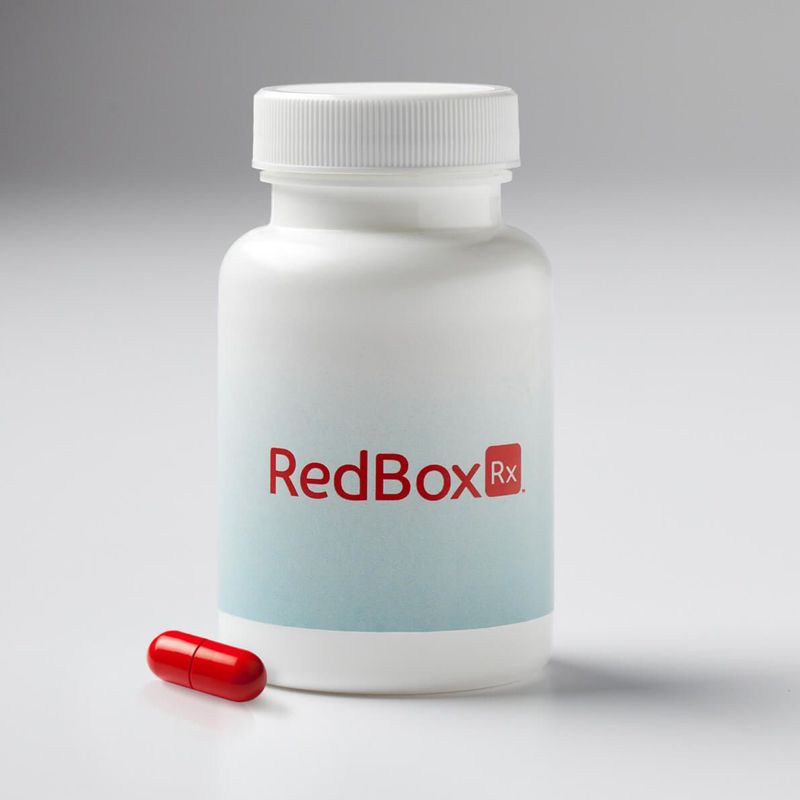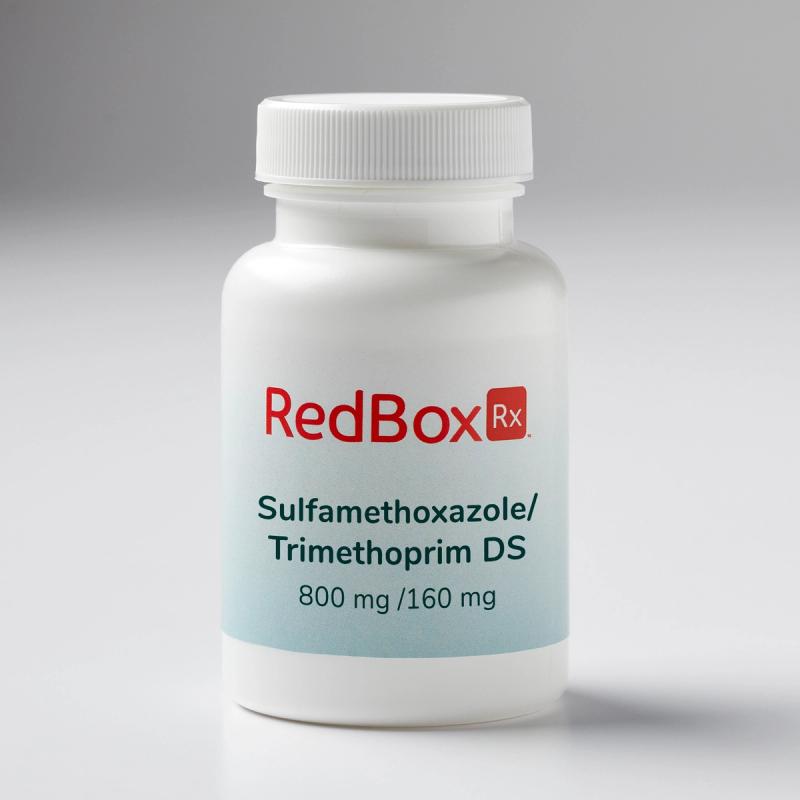Sulfamethoxazole/Trimethoprim DS FAQs
-
Sulfamethoxazole/trimethoprim antibiotic combination is prescribed to treat bacterial infections, including urinary tract infections.1 It belongs to a group of medications called sulfonamide antibiotics. It works by stopping the growth of bacteria. It will not treat colds, the flu or infections caused by viruses.2
-
Sulfamethoxazole/trimethoprim comes as a tablet and a suspension (liquid) to take by mouth. It usually is taken two times a day. Follow the directions on your prescription label carefully and ask your doctor or pharmacist to explain any part you do not understand. Take it exactly as directed. Do not take more or less of it or take it more often than prescribed by your doctor.
You should begin to feel better during the first few days of treatment with sulfamethoxazole/trimethoprim. If your symptoms do not improve or if they get worse, call your doctor.
Shake the liquid well before each use to mix the medication evenly.
Take sulfamethoxazole/trimethoprim until you finish the prescription, even if you feel better. Do not stop taking it without talking to your doctor. If you stop taking it too soon or skip doses, your infection may not be completely treated and the bacteria may become resistant to antibiotics.
-
You should begin to feel better during the first few days of treatment with sulfamethoxazole/trimethoprim. If your symptoms do not improve or if they get worse, call your doctor.
-
The amount of medicine that you take depends on the strength of the medicine. Also, the number of doses you take each day, the time allowed between doses, and the length of time you take the medicine depend on the medical problem for which you are using the medicine.3
-
The amount of medicine that you take depends on the strength of the medicine. Also, the number of doses you take each day, the time allowed between doses and the length of time you take the medicine depend on the medical problem for which you are using the medicine.4
-
Sulfamethoxazole/trimethoprim is only available by prescription5 and can be purchased online. Start a low-cost online consultation for a urinary tract infection with RedBox Rx to see if sulfamethoxazole/trimethoprim could be right for you.
-
Sulfamethoxazole/trimethoprim through RedBox Rx costs $20 per treatment (6-14 tablets) with a $39 online doctor consultation. No insurance required.
-
Before taking sulfamethoxazole/trimethoprim:
Tell your doctor and pharmacist if you are allergic to sulfamethoxazole/trimethoprim, any other medications, or any ingredients in sulfamethoxazole/trimethoprim tablets and suspension. Ask your pharmacist for a list of ingredients.
Tell your doctor and pharmacist what other prescription and nonprescription medications, vitamins, nutritional supplements and herbal products you are taking or plan to take. Be sure to mention the following: amantadine; angiotensin converting enzyme inhibitors such as benazepril (Lotensin), captopril (Capoten), enalapril (Vasotec), fosinopril (Monopril), lisinopril (Prinivil, Zestril), moexipril (Univasc), perindopril (Aceon), quinapril (Accupril), ramipril (Altace) or trandolapril (Mavik); anticoagulants (blood thinners) such as warfarin (Coumadin, Jantoven); cyclosporine (Gengraf, Neoral, Sandimmune); oral diabetes medications such as glipizide (Glucotrol), glyburide (Diabeta, Glynase), metformin (Fortamet, Glucophage), pioglitazone (Actos), repaglinide (Prandin), rosiglitazone (Avandia); digoxin (Lanoxin); diuretics (water pills); indomethacin (Indocin); leucovorin (Fusilev); medications for seizures such as phenytoin (DILANTIN, Phenytek); memantine (Namenda); methotrexate (Trexall); pyrimethamine (Daraprim) or tricyclic antidepressants such as amitriptyline (Elavil), amoxapine (Asendin), desipramine (Norpramin), doxepin (Adapin, Sinequan), imipramine (Tofranil), nortriptyline (Aventyl, Pamelor), protriptyline (Vivactil) or trimipramine (Surmontil). Your doctor may need to change the doses of your medications or monitor you carefully for side effects.
Tell your doctor if you have or have ever had thrombocytopenia (less than normal number of platelets) caused by taking sulfonamides or trimethoprim; megaloblastic anemia (abnormal red blood cells) caused by folate deficiency (low blood levels of folic acid), phenylketonuria (PKU, an inherited condition in which a special diet must be followed to prevent damage to your brain that can cause severe intellectual disability) or liver or kidney disease. Your doctor may tell you not to take sulfamethoxazole/trimethoprim.
Tell your doctor if you have or have ever had severe allergies; asthma; low levels of folic acid in the body which may be caused by malnutrition (you do not eat or cannot digest the nutrients needed for good health); human immunodeficiency virus (HIV) infection; porphyria (an inherited blood disease that may cause skin or nervous system problems); thyroid disease; or glucose-6-phosphate dehydrogenase (G-6-PD) deficiency (an inherited blood disease).
Tell your doctor if you are pregnant, plan to become pregnant or are breastfeeding. If you become pregnant while taking sulfamethoxazole/trimethoprim, call your doctor immediately. Sulfamethoxazole/trimethoprim can harm the fetus.
Plan to avoid unnecessary or prolonged exposure to sunlight and wear protective clothing, sunglasses and sunscreen. Sulfamethoxazole/trimethoprim may make your skin sensitive to sunlight.
-
Take the missed dose as soon as you remember it. However, if it is almost time for the next dose, skip the missed dose and take any remaining doses for that day at evenly spaced intervals. Do not take a double dose to make up for a missed one.
-
Unless your doctor tells you otherwise, continue your normal diet. Drink plenty of fluids during your treatment with sulfamethoxazole/trimethoprim.
-
Sulfamethoxazole/trimethoprim may cause side effects, including:
Nausea.
Vomiting.
Loss of appetite.
Tell your doctor if any of these symptoms are severe or do not go away. Sulfamethoxazole/trimethoprim may cause other side effects. Call your doctor if you have any unusual problems while taking this medication.
-
Keep this medication in the container it comes in, tightly closed, and out of reach of children. Store it at room temperature and away from excess heat and moisture (not in the bathroom).
It is important to keep all medication out of sight and reach of children, as many containers (such as weekly pill minders and those for eye drops, creams, patches and inhalers) are not child-resistant and young children can open them easily. To protect young children from poisoning, always lock safety caps and immediately place the medication in a safe location — one that is up, and out of their sight and reach.
Unneeded medications should be disposed of in special ways to ensure that pets, children and other people cannot consume them. However, you should not flush this medication down the toilet. Instead, the best way to dispose of your medication is through a medicine take-back program. Talk to your pharmacist or contact your local garbage/recycling department to learn about take-back programs in your community.
-
In case of overdose, call the Poison Control Center helpline at 1-800-222-1222. If the victim has collapsed, had a seizure, has trouble breathing or can't be awakened, immediately call emergency services at 911.
-
Keep all appointments with your doctor and the laboratory. Your doctor may order certain lab tests to check your body's response to sulfamethoxazole/trimethoprim.
Do not let anyone else take your medication. Your prescription is probably not refillable. If you still have symptoms of infection after you finish taking sulfamethoxazole/trimethoprim, call your doctor.
It is important for you to keep a written list of all the prescription and nonprescription (over the counter) medicines you are taking, as well as any products such as vitamins, minerals or other dietary supplements. You should bring this list with you each time you visit a doctor or if you are admitted to a hospital. It is also important information to carry with you in case of emergencies.
-
Bactrim®
Bactrim® DS
Septra®
Septra® DS
Sulfatrim® Suspension
-
View our telehealth and online pharmacy FAQs here.
How RedBox Rx Works

Quick, affordable UTI treatment online.
Treating urinary tract infections has never been easier. RedBox Rx offers convenient and affordable treatment, with a no-wait online doctor consultation. Get prescription medications delivered to your door or select pickup at your local pharmacy.
- Low-cost telehealth consult with a licensed medical provider.
- Sulfamethoxazole/Trimethoprim DS (Bactrim DS®) for $20 per treatment (6-14 tablets).
- Confidential, private and secure.
- Free standard shipping or expedited/overnight available.
Sorry, we’re closed for today. Our U.S. licensed medical providers are available daily 7 a.m. to 9 p.m. CST via live video visit. We look forward to serving you soon. Email us anytime at [email protected].





